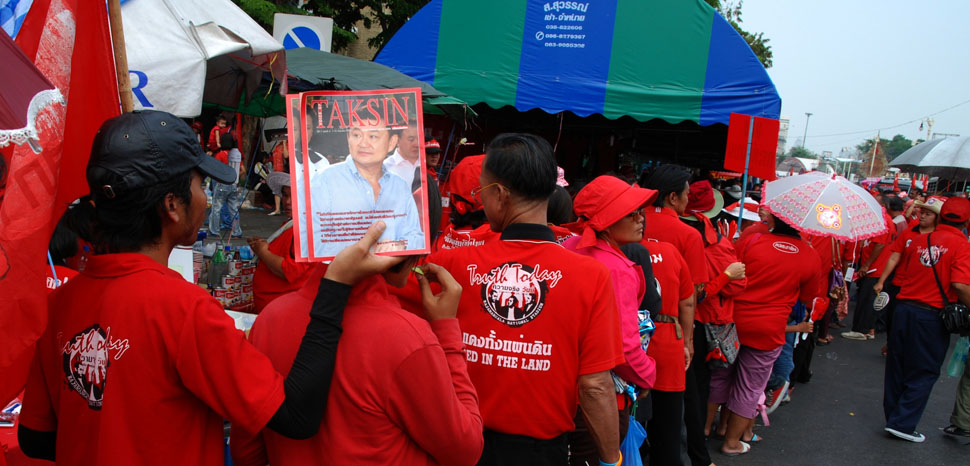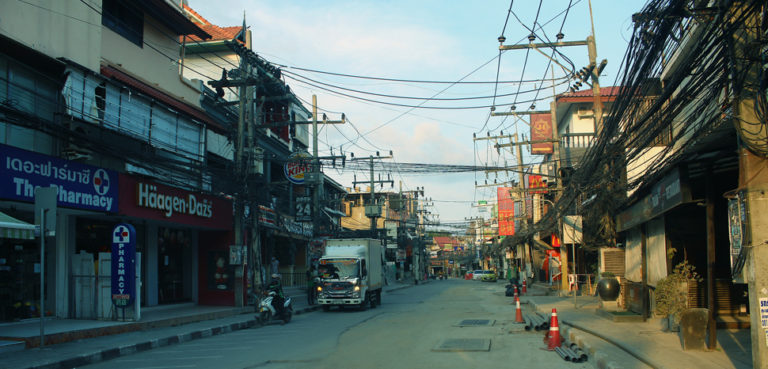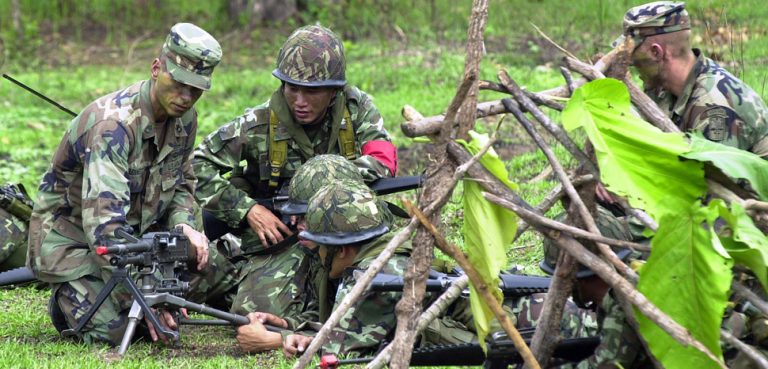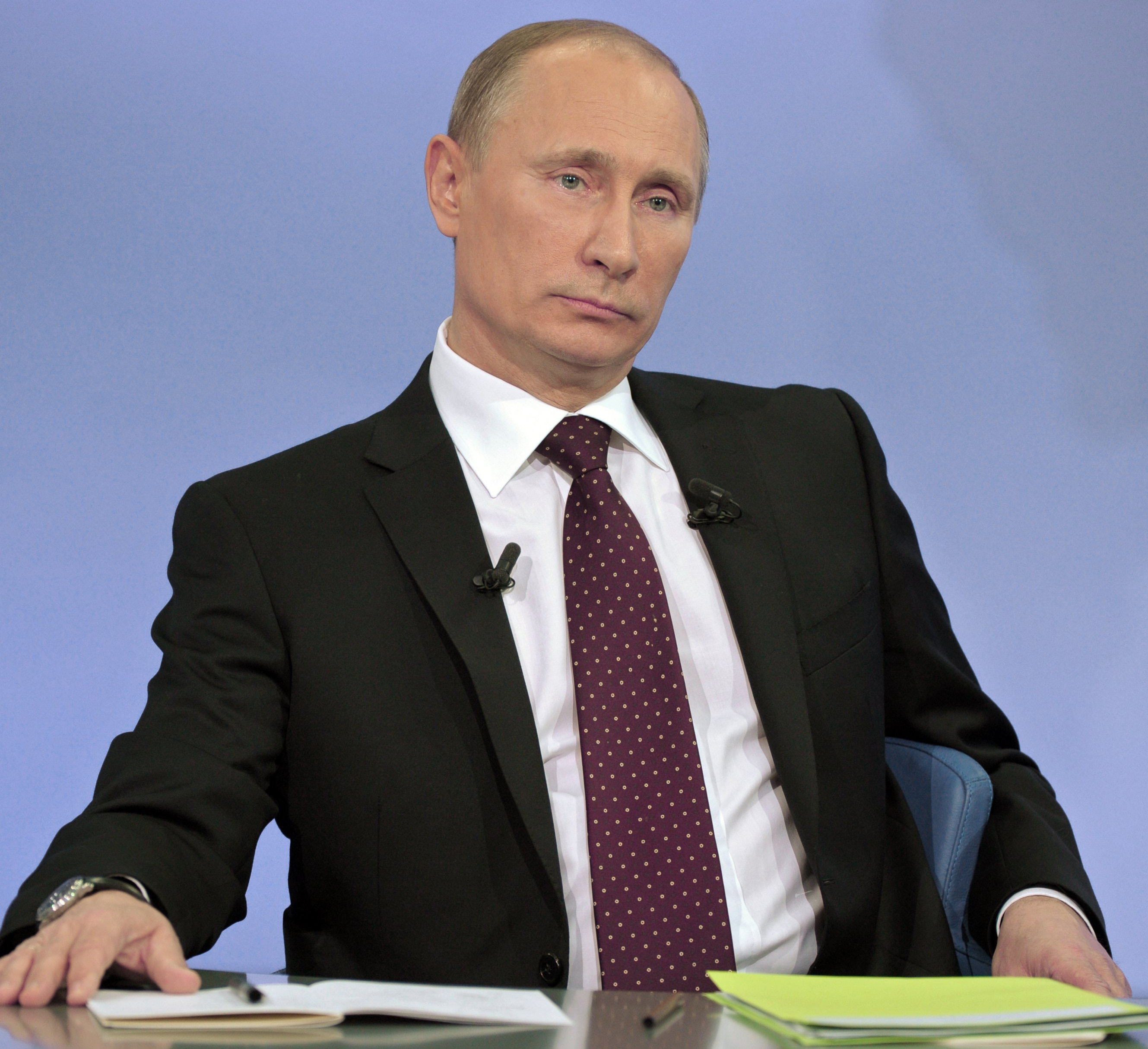A simmering discontent boiled over in Thai politics and society in the second half of 2021. Protests and anger towards the Thai government escalated due to anemic handling of the COVID-19 pandemic, slow vaccine rollout and public frustration over business disruptions and stagnating incomes due to country-wide restrictive measures. This deterioration stood in contrast to how well General Prayut Chanocha’s administration was faring earlier in the year when Thailand registered approximately 33 COVID-19 related deaths per million, relative to 234 in the Philippines, 229 in Indonesia, and 178 in Malaysia. Thailand had also avoided larger outbreaks of the virus in 2020 and kept the economy and businesses humming with timely and ample injections of fiscal stimulus packages.
Despite implementing stricter movement measures in 2021, COVID-19 cases have sharply spiked since April 2021, with an average of 13,000 cases per day, triggering a large protest on 24 June calling for General Prayut to step down. Thai protestors also continued to push for constitutional overhaul, an expedited timeline for new elections, and reform of the monarchy. On 31 October 2021, a large protest in central Bangkok was organized with the intent to oppose the reinstatement of the Royal Defamation Law. Around a month later, many protesters gathered outside the German Embassy to submit a statement opposing absolute monarchy and calling for reforms to strict lèse-majesté laws. Protesters also opposed a ruling by the Constitutional Court ruling concluding that speeches made by protest leaders earlier in the year were tantamount to overthrowing the Thai monarchy.
In November 2021, Thailand’s opposition parties attempted to pass the first version of the constitutional amendment or the “People’s Draft.” Although the Prayut administration had earlier stated there could be limited concessions to reform demands, the draft bill was rejected by an overwhelming 473 – 206 margin by Thailand’s ruling party, the Phalang Pracharat Party (PPRP), and members of the Senate. This was the second time in nearly a year that the Thai Parliament, dominated by royalist legislators, voted against proposed amendments to the military-drafted constitution. On the list of democratic demands was the elimination of parts of the post-coup military administration, including the junta-appointed Senate and the Constitutional Court.
Despite these agitations, the military-led government remains intact. The biggest threat to General Prayut’s leadership arguably occurred from within his own ranks, in the form of a serious challenge by a group of ruling party (PPRP) MPs who prepared to join the opposition in voting against his premiership in a no-confidence debate in the House of Representatives in September 2021. Prayut managed to stem this threat. However, if this plan had been successful, his premiership would have ended, and ministers in his cabinet would have had to leave office in concert.
Prayut swiftly removed two key figures at the forefront of this attempted ouster from their cabinet positions: the controversial former PPRP secretary-general Captain Thammanat Prompao and Narumon Pinyosinwat. Captain Thammanat was the Deputy Minister of Agriculture while Narumon was Deputy Labour Minister.
Captain Thammanat had claimed that he was indispensable to the Prayut administration and headed a powerful PPRP faction known as the “Four Deputies”, which included Deputy Finance Minister Santi Promphat, Narumon, and Deputy Transport Minister Athirat Rattanaset. Also, part of this faction was Athirat’s father Virat Rattanaset, the ruling coalition’s chief whip and deputy PPRP leader. These figures had close ties to PPRP leader General Prawit Wongsuwan, who, as this plot was unravelling, declared unequivocally, that he, as deputy prime minister, had no ambitions to ascend to the top post and had no knowledge of the revolt.
Shortly after, the Thai monarchy stated its continued support of Prayut’s premiership and Captain Thammanat’s attempted ouster lost traction. To political onlookers, that signaled the persistent primacy of Prayut and King Vajiralongkorn’s support for the former army chief who led the 2014 coup to expel the Pheu Thai party government of Yingluck Shinawatra.
Old Schisms and New Cleavages
Sources close to the PPRP and the Thai military allege that the challenge was hatched by 2006-coup ousted Thaksin Shinawatra, who fled Thailand in 2008 on corruption charges that he continues to assert were politically motivated. Thaksin and King Vajiralongkorn, according to longtime observers of Thai matters, could be unlikely allies, as both have long been deemed to be adversarial to the country’s old royalist establishment associated with Vajiralongkorn’s father King Bhumipol Adulyadej, which has traditionally included broad swathes of the Bangkok middle and upper classes. Leading figures of this faction include former prime minister Anand Panyarachun, who has little love for Vajiralongkorn; and Prawit who has maintained strong ties to figures and supporters of the Democrat Party linked to former premiers Chuan Leekpai and Abhisit Vejjajiva. Abhisit is also known to be opposed to Vajiralongkorn, and recently has made public statements urging Prayut to begin a more conciliatory path.
Diplomats and military sources claim that such old establishment elites fear that the monarchy, as a whole, is in peril, and thus they hope to rein in the hardline demands of students before they become even more radicalized. On the other hand, they surmise that Vajiralongkorn may have a permissive stance towards student radicalism because it works to dismantle the legitimacy of the old royalists and could prevent the old elite from reasserting its power now that newer generations of Thai elites increasingly reject royalism altogether. The attempted ouster of Prayut has been widely interpreted by these sources as a Thaksin-led attempt to collaborate with PPRP elements and Vjiralongkorn to hasten the process of reconfiguring Thai politics and society.
The rapid political transformation of the Thai middle class and high society (hi-so), by and large royalist in the past, has been evident since 2020 with large-scale anti-monarchy protests led by students from Bangkok’s elite universities, who were responding to Vajiralongkorn’s ostensible efforts to return the country to a form of anachronistic absolutism, even absolute monarchy.
From our discussions with activists and journalists on the ground, we understand that majority of protestors are youths who hail from middle to upper class backgrounds. These protestors are not strictly tied to any political party. A significant number of them support the Move Forward Party (MFP) for its anti-junta agenda and are aligned with Thanathorn Juangroonguangkit who led and co-founded the defunct MFP predecessor Future Forward Party (FFP), which also championed the return to civilian government and demilitarization of Thai politics. In 2021, Thanathorn was banned from politics for 10 years for defaming the government and on lèse-majesté charges.
The “Red Shirt” or Pheu Thai Party supporters are generally divided into two groups. The first group is led by Jatuporn Prompan, who has been a key Red Shirt leader since 2010 and was, and continues to be, closely tied to Thaksin. It’s notable that Jatuporn has stated that the monarchy’s place in Thai society and politics should be preserved. In other words, Jatuporn and Thaksin are pro-monarchy but anti-Prayut, which makes staunch royalists question whether the Red Shirts are, in strict ideological terms, on the same page. Further, by avoiding the more controversial battle, Red Shirts place the more radical demands of monarchial reform in the hands of elite university student protestors. Instead of the rural population pushing the issue, which made up the traditional Red Shirt power base, it is the sons and daughters of affluent Bangkokians (and occasionally their parents) that are now making the most incendiary demands, some of whom have shed their class biases towards the Red Shirts. To journalistic, military, and diplomatic contacts we spoke with, the shifting base of support could be a wider indicator of reconciliation between competing divisions within Thai society.
Still, it can be anticipated that Vajiralongkorn’s political provocations will continue in an effort to trigger public discontent and engender wider change among the historically feudalistic middle and upper classes society, which for decades ardently backed the most powerful and wealthiest monarchy in the world while denigrating the most popular elected prime minister in the country’s history, Thaksin Shinawatra, and his largely rural supporters in the populous northern and northeastern regions.
The Return of Thaksin?
For nearly two decades, the powerful royalists who adored King Bhumipol Adulyadej, who reigned over the country for 70 years, feared that current King Vajiralongkorn would align with Thaksin and allow Thaksin to return to the country.
The old elite under Bhumipol, which notably includes Prem Tinsulanonda, General Surayud Chulanont, and former prime minister Anand Panyarachun, long sought to coax Thaksin into believing that he could return to Thailand. The most well-known of these instances was the 2013 Amnesty Bill proposed by the Pheu Thai government of Yingluck Shinawatra. According to Pheu Thai insiders very close to Thaksin, he genuinely thought he had the green light to come home, only later to realize that it was used by old regime elites to trigger mass royalist “Yellow Shirt” protests in Bangkok that culminated in the 2014 coup d’état that removed Yingluck Shinawatra, Thaksin’s sister, and his political proxy.
As recently as June 2021, in an online discussion, Thaksin vowed to his supporters not only to return to Thailand but to come through “the front door of [Bangkok’s] Suvarnabhumi Airport.” The statement was immediately perceived by some observers to indicate that Vajiralongkorn may consider granting Thaksin some kind of royal pardon. If true, this would mark an ostensible shift by Vajiralongkorn since Thaksin-aligned forces have convinced the international community (quite successfully) into believing that Vajiralongkorn hated Thaksin.
Long-term concerns of a Thaksin return escalated when Thaksin’s ex-wife, Potiaman na Pombeira, met with Vajiralongkorn and his wife, Queen Suthida, in September 2020. The meeting was widely seen, particularly among supporters of the old establishment, as a signal from Vajiralongkorn that he was willing to consider an agreement with Thaksin. However, that agreement rested upon whether Thaksin, and the Pheu Thai Party, would work towards curtailing the ultra-progressive MFP and its supporters, including the burgeoning anti-monarchy protest movement.
According to several sources in the diplomatic community and one senior Pheu Thai Party insider, the prospect of a deal between Thaksin and the King was opposed by several key figures in Pheu Thai. For example, former Pheu Thai heavyweight and co-founder, Sudarat Keyuraphan (long considered by Bangkok royalists in a more positive light than most Pheu Thai leaders), and her team, resigned from Pheu Thai and formed the Thai Sang Thai Party. Sudarat underscored that her new party is created to be “a real political institution” and not just “started by tycoons or political dynasties, or created just for the continuation of the regime”.
The aforementioned knowledgeable sources who are also close to Sudarat claimed that she and others were disappointed that Thaksin was seeking an alliance with Vajiralongkorn and the PPRP. Thaksin’s rapprochement with the monarchy and PPRP also created waves of conflict within the opposition. Many MFP MPs and their supporters were disappointed that the largest opposition party (Pheu Thai) increasingly showed signs of aligning with the government. On the other hand, as Thaksin moved in the direction of the government and the monarchy, many traditional royalists were spurred to question their loyalty to the new establishment under King Vajiralongkorn.
2023 General Elections – Potential Scenarios
Recent constitutional amendments were announced in Thai media on 21 November. The election system amendments will reinstate a procedure removed in 2017 by the military. Voters will once again have two votes in the upcoming election: one for their constituency candidate and one for the party list. Additionally, constitutional amendments increase the number of constituency seats from 350 to 400 while reducing the number of party-list seats from 150 to 100.
The changes will favor large and well-resourced political parties such as Pheu Thai and the PPRP. They have the capabilities, expertise, and funding to field highly competitive candidates in all 400 seats and run vigorous campaigns across the country. On the other hand, it would be an uphill battle for smaller parties to obtain any House seat, unlike in the 2019 general election, when each 12 micro-parties won a single seat. This also almost certainly means that fewer parties enter parliament after the next election.
The delayed COVID-19 vaccination rollout has intensified infighting and blame-shifting within elements of the ruling political alliance while public sentiment on Prayut’s performance continues to slide. The Bhumjaithai Party, the second largest party in the ruling coalition, has publicly chastised Prayuth’s Centre for COVID-19 Situation Administration. Anutin Charnvirakul, the leader of the Bhumjaithai Party, is Deputy Prime Minister and the Minister of Public Health. Local media outlets have also begun to suggest that political groups are starting to plan for elections.
An escalation of infighting could call for an earlier election before the projected middle of 2023. Prayuth retains control of the ruling camp’s alliance, led by the PPRP, but his administration is unstable. Since the coalition’s establishment in mid-2019, PPRP, Democrat Party, Bhumjaithai, and several smaller parties have been engaged in constant internal strife. Noticeably, despite being the leader of the ruling coalition, Prayut does not belong to any political party. In addition, he has no intention of joining any political party, old or new.
The Pheu Thai party is gearing up for what they call “a landslide victory in the next election” and have been targeting younger voters in the next election across a range of economic segments. Beyond its traditional support base, the poor in the rural northern and northeastern regions, it is estimated that there will be around 16.07 million votes from “Generation Y” (27 to 35-year-olds) and “Z” (18 to 26-year-olds) for the first time in the next election. Meanwhile, according to a survey conducted by Thailand’s National Institute of Development Administration (NIDA) in 2021, 30.77% and 32.59% of respondents aged 18-25 years and 26-35 years respectively supported the MFP, the successor to the dissolved Future Forward Party (FFP). In contrast, support for Pheu Thai from these two youngest groups were just 18.88% and 16.61%, respectively. Part of Pheu Thai’s strategy would be to focus on converting MFP support to its own (aligning and cultivating an image of solidarity with Thanathorn) and capturing more votes from these 16 million young voters during the next election.
Noticeably, On 28 October, at the Pheu Thai meeting in Khon Kaen, the party introduced Thaksin’s youngest daughter, Paetongtarn Shinawatra, as a new advisor of Pheu Thai’s Inclusion and Innovation Advisory Committee. This development has been perceived by observers to be a signal of a Shinawatra family comeback. Notably, in Paetongtarn’s debut speech, the 35-year-old real-estate chief executive, said she would try her best to understand the problems as well as desire and aspirations of the country’s youth, bridge the generational gaps in the country, and facilitate her father’s (Thaksin’s) strong wish to return to Thailand.
However, both Thaksin and her daughter have not confirmed or denied the possibility of whether she was going to be put up as a potential candidate for prime minister in the future. Observers suggest Paetongtarn’s political trajectory would likely mirror Yingluck’s in view of the continuing influence of Thaksin and his ex-wife and Paetongtarn’s mother, Potjaman Na Pombejia, not only in Thai politics and society but within Pheu Thai, particularly in terms of control over the party’s finances. Two key scenarios emerge against Thailand’s current political backdrop:
Scenario 1: Military Oversight with Weakened Democracy
The first follows the implosion of Prayut’s administration brought about by his ineffective response to COVID-19 mitigation and vaccination. Confidence and legitimacy in the Prayut government has been undermined and ruling party coalition faces dissolution due to intensified infighting and bartering of allegiances for coveted cabinet positions. In this scenario, the coalition cannot hold, and an early election is called in the first or second quarter of 2023.
It is expected the military-aligned bloc (spearheaded by the PPRP or a similar incarnation) to retain the majority and preserve its power and influence in politics with support from the monarchy. General Prayut would, however, welcome the PPRP’s re-nomination in the run-up to the next general election. He faces intense competition from within his own ranks, including from the Deputy Prime Minister, General Prawit Wongsuwan. Prayut also faces growing public disapproval, with recent protests calling him to resign. The military-royalist alliance could replace Prayut with another new, pro-military, figure.
We anticipate the military will seek to maintain its political control, particularly considering disputed electoral outcomes where opposition parties might band together in a governing coalition. In such a scenario, a military-backed government coalition would appear to provide Thailand with medium-term stability.
Scenario 2: Pheu Thai Victory and the Return of Thaksin Shinawatra
In this scenario, Pheu Thai and its allies, achieve a landslide victory over the ruling coalition in the election, potentially paving the way for Thaksin ’s return to Thailand. However, such an outcome, in the view of a veteran political analyst of Thai affairs, “only makes sense or is tenable if Thaksin and the other Shinawatras manage to cultivate widespread reconciliation with the range of stakeholders and playmakers from within the military, the ultra-progressive camp and their leader Thanathorn, the Bangkok elites, and ultimately the monarchy.”
Failing that, it is anticipated that the military will once again take control if the ruling coalition falls apart or if there is indecision regarding the validation of Pheu Thai’s probable electoral victory. Recent developments suggest that the Shinawatras have been actively canvassing support from, and forging alliances with, stakeholders from across the political spectrum.
Conclusion
In recent years, certain well-placed sources – all critics of the old establishment but not directly tied to Thaksin – have stated or delicately intimated that Vajiralongkorn would instigate large-scale protests. Several of these sources also suggested that protests would topple General Prayut and force him to flee abroad, only to return later at around the same time as Thaksin, thereby signaling some kind of national reconciliation and overcoming the tumultuous “red versus yellow” divide that had plagued the country for nearly two decades. Such views differ dramatically from most diplomatic and media sources, who echo the widespread view in the foreign media that Vajiralongkorn aims for absolute control.
However, misdirection is commonplace in Thai politics, and especially necessary for figures with views that were relatively critical of royalist ideology under Bhumipol. This is why the Thai public and foreign diplomats remain utterly unaware of the depth of Thaksin – and now even Thanathorn – support in elite quarters of the military and simultaneous criticism of the old establishment.
While the COVID-19 crisis has contributed to unprecedented opposition to Prayut and his government, it has also stymied the protest movement that the aforementioned sources anticipated. The government has more recently resorted to violence by the police, and it is quite possible that security forces will intensify crackdowns to further weaken the government – and by extension the military and monarchy’s – reputation, most especially among its past stalwarts.
The Red Shirts have taken a backseat on radical demands such as reforms of the monarchy and instead will defer to the Bangkok middle and upper classes to push forward on such issues. This has nothing to do with ideology. It is purely tactical. Red Shirts deeply hated the monarchy during Bhumipol’s era but were powerless given the widespread, feudalistic reverence for the former king in Bangkok. With students from Thailand’s elite universities – formerly by and large filled with royalists – being at the forefront of progressive demands, the demands will hold much more credibility in the eyes of moderate royalists.
For now, analysts in Bangkok remain somewhat split on Prayut remaining in power. However, it is extremely likely that, in the run-up to the next election, Thais will be provoked more by government scandals, threats, and crackdowns, ultimately resulting in more opposition to the establishment among the old establishment and its support base. This is a process that will continue to accelerate in the coming years, contributing to an increasingly dramatic democratic transformation of middle and hi-so society, which is hopefully allowed to proceed peacefully to the polls in 2023.
*This article was originally published on April 28, 2020.
Jeremy Tan is a Managing Director and Global Investigations Lead for ASEAN at J.S. Held Asia Intelligence.
The views expressed in this article belong to the authors alone and do not necessarily reflect those of Geopoliticalmonitor.com




